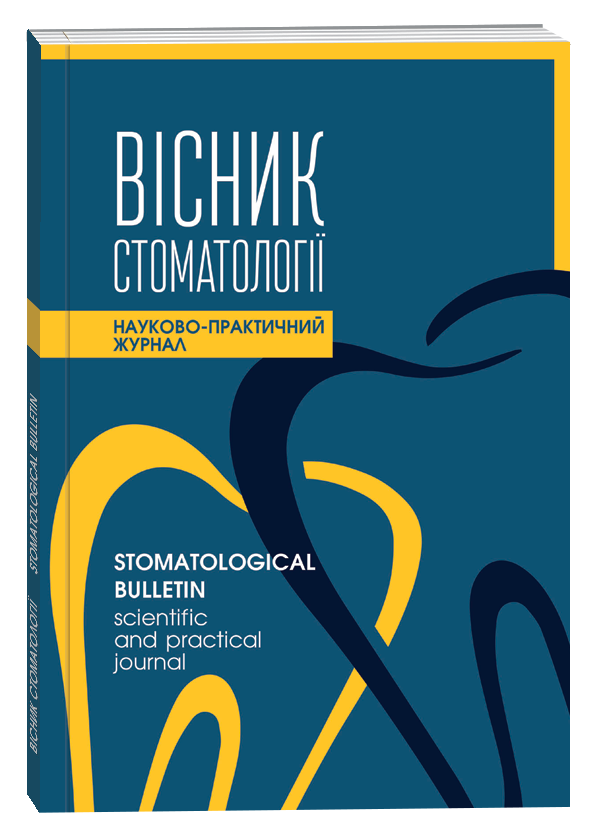FEATURES OF FIXING MINI-PLATES IN FRACTURES OF THE ANGLE OF THE LOWER JAW IN CHILDREN
DOI:
https://doi.org/10.35220/2078-8916-2020-38-4-78-83Keywords:
lower jaw angle fracture, children, osteosynthesisAbstract
Currently, according to the literature, there is a steady trend towards an increase in the frequency of jaw frac-tures in childhood. At the same time, fractures of the low-er jaw occupy the second place in frequency among all fractures of the maxillofacial region.
Most often, fractures of the maxillofacial region in chil-dren occur during the periods of 6-7 years – the time of the beginning of school attendance, 12-14 years – a sig-nificant increase in physical activity, participation in sports competitions and training, 16-18 years – hooligan injuries. According to scientific sources, the frequency of fractures of various parts of the lower jaw varies.
The purpose of this study. Improving the effectiveness of treatment of mandibular angle fractures in children aged 6-8 years by determining the optimal place for fixing mini-plates using the analysis of computed tomograms.
Materials and methods of research. We analyzed the medical records of children with fractures of the angles of the lower jaw, who were treated by osteosynthesis in the maxillofacial departments of the city hospitals of Dnipro for the period from 2012 to 2020. Our analysis of 23 tomograms of children aged 6-8 years revealed the clos-est possible location of the mandibular canal in 100 % of cases. After studying the orthopantomograms and com-puted tomograms of the examined children with variable bite, we developed our own method of fixing the mini-plate. We have proposed and developed a technique for fixing the mini-plate along the outer oblique line with four drilling points for screws in safe zones.
One of the main stages of successful treatment of mandib-ular angle fractures in children aged 6-8 years by osteosynthesis is the justification of the location of screws for fixing mini-plates.
References
Natu S. S., Pradhan H., Gupta, H., Alam S., Gupta S., Pradhan R., Agarwal A. An Epidemiological Study on Pat-tern and Incidence of Mandibular Fractures. Plastic Surgery In-ternational, 2012;8:1–7. doi: 10.1155/2012/834364
Bykowski P. N., James James M. R., I. B., Daniali L. N., Clavijo-Alvarez J. A. The Epidemiology of Mandibular Fractures in the United States, Part 1: A Review of 13,142 Cases from the US National Trauma Data Bank. Journal of Oral and Maxillofacial Surgery. 2015;73(12):2361–2366.
Morris C., Bebeau N. P., Brockhoff H., Tandon R., Tiwana P. Mandibular Fractures: An Analysis of the Epidemi-ology and Patterns of Injury in 4,143 Fractures. Journal of Oral and Maxillofacial Surgery. 2015;73(5):951.e1–951.e12. doi:10.1016/j.joms.2015.01.001
Sanu O.O., Ayodele A.OS., Akeredolu M.O. Man-agement of pediatric mandibular fracture using orthodontic vac-uum-formed thermoplastic splint: A case report and review of literature. Nigerian journal of clinical practice. 2017;5(20):637-641.
Pogranychna H.R. Principles of treatment of lower jaw fractures. Medycyna transportu Ukrai'ny. 2013;3:86-90.
Kim M.-Y., Kim C.-H., Han S.-J., Lee J.-H. A com-parison of three treatment methods for fractures of the mandibular angle. International Journal of Oral and Maxillofacial Sur-gery. 2016;45(7):878–883.
Ferrari R., Lanzer M., Wiedemeier D., Rücker M., Bredell M. Complication rate in mandibular angle fractures-one vs. two plates: a 12-year retrospective analysis. Oral and Maxil-lofacial Surgery. 2018;22(4):435-441.









